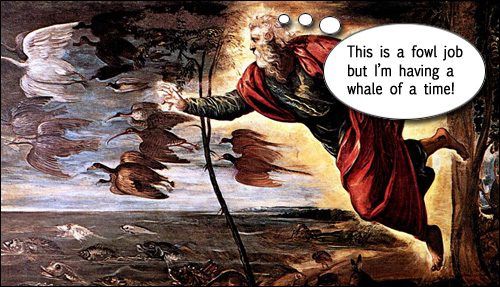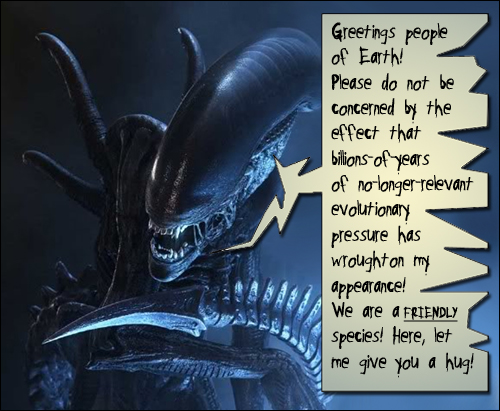Fri 20 Nov 2009
It’s a Living…
Posted by anaglyph under Atheism, God Creates..., Philosophy, Religion, Science, Skeptical Thinking, The Baffling Bible
[14] Comments
Day 3 (cont):
~ And God said, Let the earth bring forth grass, the herb yielding seed, and the fruit tree yielding fruit after his kind, whose seed is in itself, upon the earth: and it was so.
~ And the earth brought forth grass, and herb yielding seed after his kind, and the tree yielding fruit, whose seed was in itself, after his kind: and God saw that it was good
In other words, God made all the plants. And felt mighty pleased with himself. Then he remembered that maybe the plants would all DIE if they had no sunlight (at least they had plenty of water), so when he went home that night he obviously scribbled up a few ideas for the next day’s chores.
Day 4:
~ And God said, Let there be lights in the firmament of the heaven to divide the day from the night; and let them be for signs, and for seasons, and for days, and years:
~ And God made two great lights; the greater light to rule the day, and the lesser light to rule the night: he made the stars also.
OK, so I just want to go over that. In the first verse it says God made some lights in the firmament, and then in the next one he made the sun and the moon and the stars. What the fuck is the person who wrote this smoking? If he made lights in the firmament, what were they if they weren’t the stars? And didn’t he already make light anyway? Where the hell was that coming from if it wasn’t from the sun or the moon or the stars? ((Out of his ass is the obvious answer. OK, I guess if anyone can claim that the sun shines out of his ass, it’s God, come to think of it))
If these verses tell us anything, it is that God is very fucking badly organized. Why the crap didn’t he do the sun & the stars and so forth before he did the Earth? It’s like he was doing this for the first time or something. Oh, right.
Anyway, God set the sun & stars in place…
…to rule over the day and over the night, and to divide the light from the darkness: and God saw that it was good.
Here he is acting smug again, even though he’s royally screwed up Day 4. Can it possibly get any worse?
Day 5:
~ And God said, Let the waters bring forth abundantly the moving creature that hath life, and fowl that may fly above the earth in the open firmament of heaven.
~ And God created great whales, and every living creature that moveth, which the waters brought forth abundantly, after their kind, and every winged fowl after his kind: and God saw that it was good.
On the Fifth Day we find God creating winged fowl and whales. The most astute of you will have already noticed that God’s To Do List for Day 5 specifically describes ‘Birds and Fish’ and so again he has fucked up from the get-go by creating whales, which as anyone knows are mammals and not fish. As for the fowl, he has given them free reign to flap around the firmament, which, as we learned from the last installment he designated as Heaven. Yes, that’s right – Heaven is full of chickens.

Stay tuned to Tetherd Cow Ahead for Episode 3 of ‘What God Did’, where we find out what God got up to on Day 6, and examine in depth his obsession with ‘creeping things’.









